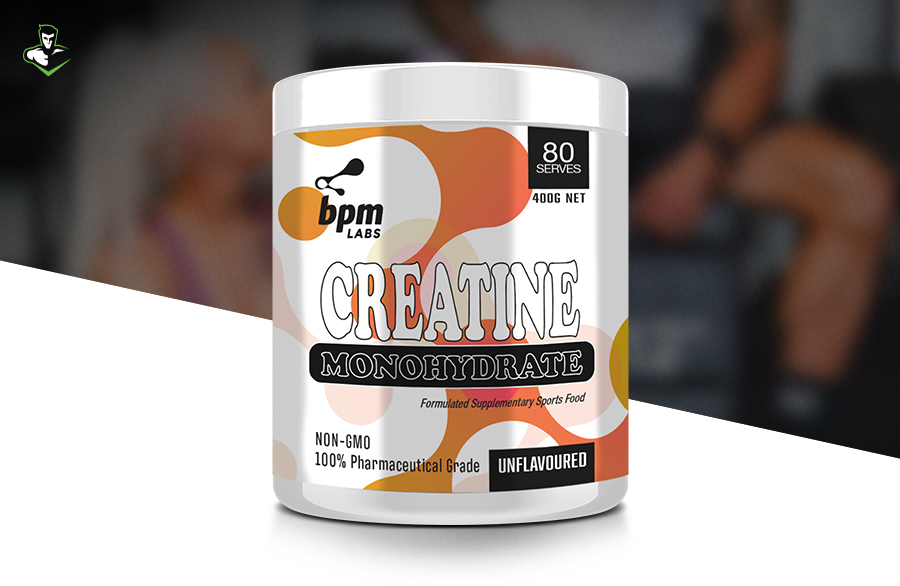
100% Pharmaceutical Grade Creatine Monohydrate
- Supports Strength & Power
- Aids Muscle Growth
- Micronised Fine Particle Size
- Non-GMO


BPM Labs Creatine Monohydrate is a supplement that provides high-quality 100% micronized Creatine Monohydrate with no additives or fillers. This product is unflavoured and can be mixed with a variety of pre-workouts, aminos & proteins.
Creatine Monohydrate is a well-researched supplement that is known to increase physical performance safely. It is a popular choice for bodybuilders & athletes. Creatine is found naturally in the body and in small amounts in meat and fish.
Using Creatine Monohydrate can support strength and power & help increase physical performance. It is a convenient everyday supplement and can be used for all types of sports and exercise.
BPM Labs Creatine Monohydrate
- Is BPM Labs Creatine Monohydrate suitable for vegetarians or vegans?
Yes, BPM Labs Creatine Monohydrate is suitable for vegetarians & vegans. It is a pure form of creatine monohydrate derived from non-animal sources.
- Can women use BPM Labs Creatine Monohydrate?
Yes, women can use BPM Labs Creatine Monohydrate. It is a safe & effective supplement for both men & women who are looking to enhance their physical performance. However, as with any dietary supplement, it's advisable for pregnant or breastfeeding women to consult with their healthcare provider before using creatine or any other supplement.
- How long does it take to see results from using BPM Labs Creatine Monohydrate?
The timeframe to notice results may vary depending on individual factors such as metabolism, training routine, & diet. Some individuals may experience initial strength gains & improved performance within the first few weeks of consistent creatine supplementation, while others may take longer. It's important to note that creatine works gradually & its full effects may be observed over an extended period of consistent use.
- Should I cycle on and off creatine monohydrate?
The practice of cycling creatine supplementation is a matter of personal preference and can vary based on individual goals & circumstances. Cycling refers to taking creatine for a specific period, followed by a period of discontinuation.
There is no definitive consensus on whether cycling creatine is necessary or more beneficial than continuous supplementation. Here are two approaches commonly followed:
Continuous Use: Many individuals choose to take creatine consistently without cycling. This approach involves taking a daily maintenance dose of creatine without any planned periods of discontinuation. Continuous use ensures a steady saturation of creatine in the muscles, allowing for consistent benefits over time.
Cycling: Some people prefer to cycle creatine by using it for a defined period, typically 8-12 weeks, followed by a period of discontinuation. The cycling period is often followed by a "loading phase" where a higher dosage is taken for the first week or two to quickly saturate the muscles. The purpose of cycling is to give the body a break from creatine supplementation and potentially assess if there are any changes in response when not taking it.
If you decide to cycle creatine, it's important to note that during the period of discontinuation, your muscle creatine levels will gradually decrease. When you resume supplementation, it may take a few weeks to reach the same levels as before.
Ultimately, the decision to cycle or not to cycle creatine is up to you. It may be helpful to consider your specific goals, consult with a healthcare professional or a qualified sports nutritionist, & monitor how your body responds to different approaches. They can provide personalized recommendations based on your individual needs & circumstances.
- Does Creatine Monohydrate cause water retention and bloating?
Creatine supplementation can cause an increase in water retention in some individuals. When you consume creatine, it draws water into the muscles, which can result in a slight increase in overall body water weight. This is known as "creatine water weight" or "creatine bloating." It's important to note that the water retention is intracellular (inside the muscle cells) & not subcutaneous (under the skin), so it does not typically cause a visibly bloated or puffy appearance.
The extent of water retention varies from person to person. Some individuals may experience a noticeable increase in water weight, while others may not experience much at all. Factors such as dosage, individual response, & hydration levels can influence the degree of water retention.
It's important to stay well-hydrated when taking creatine to support its effectiveness & to help manage any potential water retention. Additionally, the water weight gained from creatine is temporary & typically resolves once you discontinue supplementation.
If you have any concerns about water retention or its impact on your goals, it's recommended to consult with a healthcare professional or a qualified sports nutritionist for personalized advice.
- What are the directions for consuming BPM Labs Creatine Monohydrate?
Take 1 scoop (5g) of BPM Labs Creatine Monohydrate & mix it with 10 oz (300 mL) of water. It can be added to your pre or post-workout beverage. Please follow the recommended serving size.
- How can Creatine Monohydrate benefit me?
Using Creatine Monohydrate as a supplement can support strength, power, & increase physical performance. It is suitable for various sports & exercises & can be used by bodybuilders, athletes, & individuals looking to improve their fitness levels.
- What is Creatine Monohydrate?
Creatine Monohydrate is a well-researched supplement known to increase physical performance safely. It is naturally found in the body and in small amounts in meat & fish. BPM Labs Creatine Monohydrate offers a convenient & reliable way to supplement your daily intake of creatine.
- What is BPM Labs Creatine Monohydrate?
BPM Labs Creatine Monohydrate is a high-quality supplement that provides 100% micronized Creatine Monohydrate with no additives or fillers. It is unflavored and can be easily mixed with pre-workouts, aminos, & proteins.


